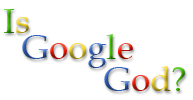 Over at The Daily—my latest commentary on consumer technology gets theological:
Over at The Daily—my latest commentary on consumer technology gets theological:
Apple CEO Steve Jobs returned to the stage earlier this month to announce a long-awaited new product: iCloud. “We’re going to demote the PC and the Mac to just be a device,” he said. “We’re going to move your hub, the center of your digital life, into the cloud.” No longer will the data that circumscribe our lives, from our dental records to our unfinished novels, remain confined to the tangible shells that presently contain them. They’ll live elsewhere, up there, in a better place.
Apple may be the latest to try, but no company has puffed out more clouds than Google. All of the Google services so many of us depend on — Gmail, Docs, Calendar, Reader, YouTube, Picasa — lure our electronic selves, bit by bit, out of our computers and up into the cloud. If the cloud is a heaven for our data, a better place up in the sky, then Google is, well, kind of like God. But what kind of God?
Some have actually tried to find out. Their efforts may appear to be mere intellectual exercises. But they raise serious questions about the nature of faith. In 2004, a Universal Life Church minister named Peter Olsen started the Universal Church of Google; last year, the misleadingly named First Church of Google appeared as well. But by far the most developed denomination is the Church of Google, founded by a reclusive young Canadian around 2006. It comes complete with scriptures, ministers, prayers, a holiday and, best of all, nine proofs that Google is “the closest thing to a ‘god’ human beings have ever directly experienced.”
Read the rest: “Google as God.”